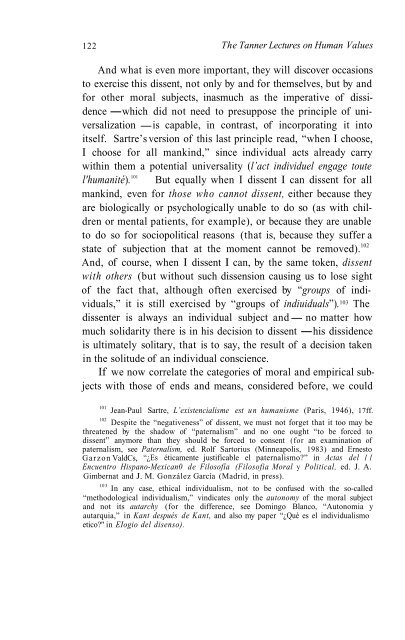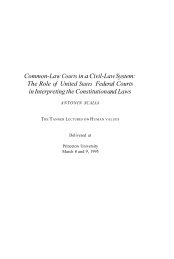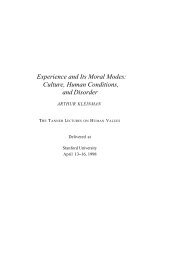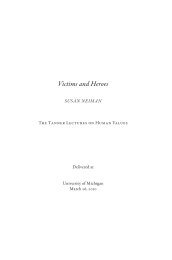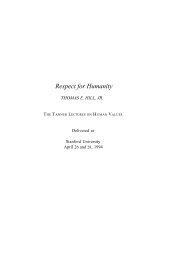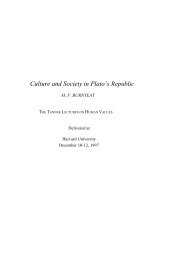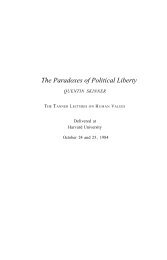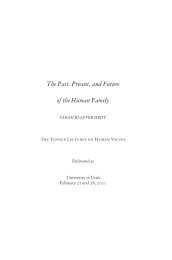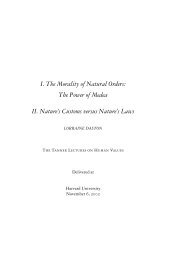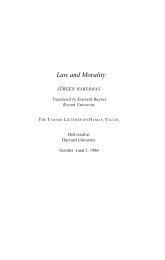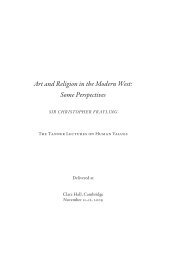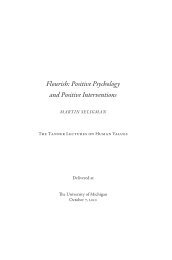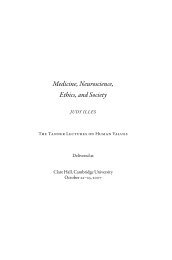Muguerza, Javier - The Tanner Lectures on Human Values
Muguerza, Javier - The Tanner Lectures on Human Values
Muguerza, Javier - The Tanner Lectures on Human Values
You also want an ePaper? Increase the reach of your titles
YUMPU automatically turns print PDFs into web optimized ePapers that Google loves.
122 <str<strong>on</strong>g>The</str<strong>on</strong>g> <str<strong>on</strong>g>Tanner</str<strong>on</strong>g> <str<strong>on</strong>g>Lectures</str<strong>on</strong>g> <strong>on</strong> <strong>Human</strong> <strong>Values</strong>And what is even more important, they will discover occasi<strong>on</strong>sto exercise this dissent, not <strong>on</strong>ly by and for themselves, but by andfor other moral subjects, inasmuch as the imperative of dissidence- which did not need to presuppose the principle of universalizati<strong>on</strong>- is capable, in c<strong>on</strong>trast, of incorporating it intoitself. Sartre’s versi<strong>on</strong> of this last principle read, “when I choose,I choose for all mankind,” since individual acts already carrywithin them a potential universality (l’act individuel engage toutel'humanité). 101But equally when I dissent I can dissent for allmankind, even for those who cannot dissent, either because theyare biologically or psychologically unable to do so (as with childrenor mental patients, for example), or because they are unableto do so for sociopolitical reas<strong>on</strong>s (that is, because they suffer astate of subjecti<strong>on</strong> that at the moment cannot be removed). 102And, of course, when I dissent I can, by the same token, dissentwith others (but without such dissensi<strong>on</strong> causing us to lose sightof the fact that, although often exercised by “groups of individuals,”it is still exercised by “groups of indiuiduals”). 103 <str<strong>on</strong>g>The</str<strong>on</strong>g>dissenter is always an individual subject and-no matter howmuch solidarity there is in his decisi<strong>on</strong> to dissent - his dissidenceis ultimately solitary, that is to say, the result of a decisi<strong>on</strong> takenin the solitude of an individual c<strong>on</strong>science.If we now correlate the categories of moral and empirical subjectswith those of ends and means, c<strong>on</strong>sidered before, we could101 Jean-Paul Sartre, L’existencialisme est un humanisme (Paris, 1946), 17ff.102 Despite the “negativeness” of dissent, we must not forget that it too may bethreatened by the shadow of “paternalism” and no <strong>on</strong>e ought “to be forced todissent” anymore than they should be forced to c<strong>on</strong>sent (for an examinati<strong>on</strong> ofpaternalism, see Paternalism, ed. Rolf Sartorius (Minneapolis, 1983) and ErnestoGarz<strong>on</strong>ValdCs, “¿Es éticamente justificable el paternalismo?” in Actas del I IEncuentro Hispano-Mexican0 de Filosofía (Filosofia Moral y Political, ed. J. A.Gimbernat and J. M. G<strong>on</strong>zález García (Madrid, in press).103 In any case, ethical individualism, not to be c<strong>on</strong>fused with the so-called“methodological individualism,” vindicates <strong>on</strong>ly the aut<strong>on</strong>omy of the moral subjectand not its autarchy (for the difference, see Domingo Blanco, “Aut<strong>on</strong>omia yautarquia,” in Kant después de Kant, and also my paper “¿Qué es el individualismoetico?" in EIogio del disenso).


